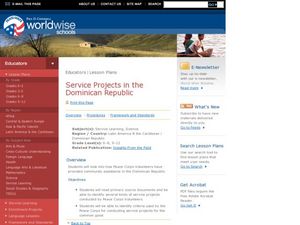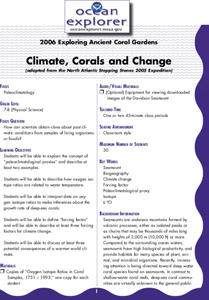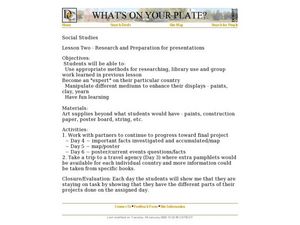Curated OER
Service Projects in the Dominican Republic
Students examine the role of Peace Corps volunteers. In this service instructional activity, students investigate service projects that feature agriculture, small business, education, environmental education, and health concerns in the...
Curated OER
The Father of Our Country
Explore United States history with this lesson on George Washington and the Revolutionary War. After reading biographical information about George Washington, learners make a list of ten reasons for the revolution. They create a timeline...
National Endowment for the Humanities
Hosting a Diplomatic Reception
The toasts are written, the table is set: it's time to party! Young scholars use a role-playing activity to go toast to toast. After researching and writing toasts for their allied countries during the modern Age of Empires, individuals...
EngageNY
Grade 9 ELA Module 4, Unit 1, Lesson 9
The supplemental text, "How Your Addiction to Fast Fashion Kills," allows learners to compare how other writers use evidence to support the argument that "rich countries benefit from harsh and abusive labor practices in poor countries."...
National Constitution Center
Civil Liberties and Rights Worldwide
How do governments differ in how they protect human rights? While the United States prides itself on its Bill of Rights, other countries have their own ways of protecting citizens' liberties. An interactive website, paired with...
National Endowment for the Humanities
Learning about Early Modern Era Empires
You are a diplomat during the Age of Empire: prepare a briefing about your country. Young scholars take on the challenge using a role-play exercise to examine various empires during the rise of global interconnectedness. Materials...
NOAA
Climate, Corals and Change
Global warming isn't just an issue on land; deep ocean waters are also showing troubling signs. Young scientists learn more about deep water corals and the many recent discoveries researchers have made. Then they examine data related to...
Agency for Toxic Substances and Disease Registry
Don't Mess with Mercury (Lesson B)
At one point, people thought mercury was therapeutic for humans, but now we know it is highly toxic. The second of three activities covering mercury focuses on its health hazards if humans are exposed. Pairs research and answer questions...
Teaching Tolerance
Changing Demographics: What Can We Do to Promote Respect?
America has always been seen as a melting pot to the world. Scholars research the concept of blending cultures in the United States and how it is changing over time. The final lesson of a four-part series analyzes the changing...
California Department of Education
What’s A Hot Job?
What jobs are the next best thing? Curious career scholars explore their options in lesson three of a five-part series. Pupils research job trends and labor statistics before discussing the factors that influence occupation trends.
California Department of Education
Etiquette? What’s That?
Business etiquette is a big deal! Are your scholars prepared to impress in the business world? The third in a series of six college and career readiness lessons focuses on basic behaviors in business situations. Groups research specific...
National Woman's History Museum
The Equal Rights Amendment
The debate over the Equal Rights Amendment continues. To better understand the controversy, class members research the history of attempts to get the amendment ratified. In addition, pairs engage in a structured academic conversation...
Anti-Defamation League
What are Reparations and Should We Enact Them?
Young social scientists investigate recent legislative proposals for reparations for African Americans. They examine the rationale behind the proposals by viewing videos and reading related articles. To close the lesson, scholars craft a...
Pulitzer Center
Food Insecurity
Food insecurity, whether as a result of food scarcity or a lack of nutritious food, is a growing and serious problem in the world today. After discussing the concept of food insecurity, learners listen to an NPR radio broadcast on the...
John F. Kennedy Presidential Library & Museum
Military Advisers in Vietnam: 1963
How did the beginning of the Vietnam War factor into the Cold War with the Soviet Union? As part of a study of American involvement in Vietnam, class members read a letter address to President Kennedy and his response in which...
PBS
A Veterans Day Thank You Note
This Veterans Day inspire scholars to say thank you to a veteran. Here, learners discover key details about a specific war using an interactive timeline, and then write a thank you letter offering their gratitude to someone who risked...
Advocates for Human Rights
The Right to a Clean Environment: Water
First, young citizens learn about water consumption by doing some research themselves on their home water usage and sharing their findings with the class. Then, they do some brainstorming and devise a plan to reduce water consumption.
The Alamo
A Lesson in Citizenship
What does it mean to be an American citizen? Lieutenant Colonel Commander William Barret Travis believed that it meant honor to country first—even above one's own life. Middle and high schoolers read his final letters from the Alamo that...
National Woman's History Museum
19th Amendment
As part of a study of the women's suffrage movement and the ratification of the Nineteenth Amendment, young historians examine documents that detail when voting rights were granted to women in various countries and when US states...
Academy of American Poets
Teach This Poem: “In This Place (An American Lyric)” by Amanda Gorman
Amanda Gorman, the United States's first National Youth Poet Laureate, is featured in a resource from the Academy of American Poets. Class members first read Dr. Martin Luther King, Jr.'s "I Have A Dream" speech and note what King wanted...
National Endowment for the Humanities
The Realism in Magical Realism
A lesson plan on magical realism has young historians research how Garcia Marquez weaves historical events and his own experiences into One Hundred Years of Solitude. Using historical records and information found in a biography of...
Curated OER
Eggs of the World (World Egg Day)
Students celebrate World Egg Day. For this egg-decorating lesson, students research egg traditions from other countries and then use their findings to decorate an egg in the tradition of the country they studied.
Curated OER
What's on Your Plate? Lesson 2
Students research countries of the world. In this global studies lesson, students discover details of cultures in the world as they become experts on selected countries. Students create posters and brochures that feature their findings.
Curated OER
The People Next Door
Students explore the culture and tradition of neighboring countries. In this geography lesson, students use travel brochures, reference materials, and Internet sites to investigate the business, fashion, language, and entertainment of...
Other popular searches
- Country Reports
- Country Research Reports
- Geography Country Reports
- Country Reports Poster
- Student Country Reports
- Passport Country Reports
- Asia Country Reports
- Asian Country Reports
- Research on Country Reports
- Multimedia Country Reports
- Country reports.org
- Country Book Report

























